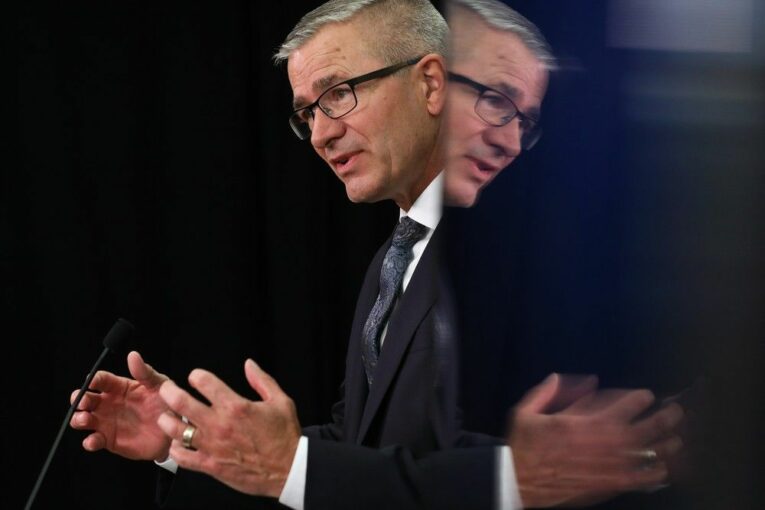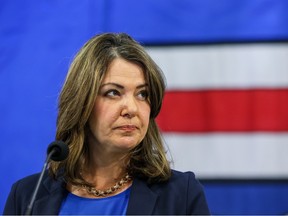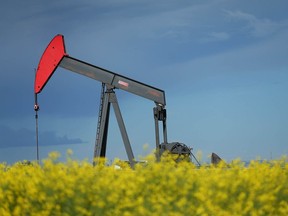
Alberta’s outgoing finance minister has a few words of sage advice for Alberta’s incoming finance minister.
Keep the books balanced and be prepared to turn down your colleagues if things get tough.
“Don’t be afraid of developing a reputation as a minister that says ‘No,’” outgoing finance minister Travis Toews, who will be handing off the portfolio Friday, said in an interview.
“The finance minister can have a lonely role … You’re the one that’s ultimately tasked with ensuring a strong balance sheet, ensuring a healthy financial statement and a balanced budget. Every other minister has a different assignment — and every other ministry requires those resources.
“So my advice to the next finance minister? Don’t be afraid to say no and don’t be concerned if you end up with a reputation as a minister who says no. That means you’re doing your job.”
On Friday, Premier Danielle Smith will unveil her new provincial cabinet and political watchers will be keeping a close eye on who takes over the chore of overseeing Alberta’s $71-billion spending plan.
The economic outlook in Alberta this year is more buoyant than in most other provinces, although a high level of uncertainty still exists.

Interest rates continue to climb with Wednesday’s surprising decision by the Bank of Canada to push the overnight rate up by 25 basis points to 4.75 per cent. It came after inflation rose by 4.4 per cent in April, including a 4.3-per-cent hike in Alberta, compared to prices a year earlier.
Three separate forecasts this week all show Alberta is expected to report among the highest economic growth rates in the country in 2023 — at 2.4 per cent — but it is substantially below last year’s levels.
On Thursday, ATB Financial also projected the province’s economy to grow by 2.2 per cent in 2024, with its forecast reflecting higher interest rates, a dip in commodity prices and a weaker global economy.
The economic impact tied to the Alberta wildfires in the past month, which temporarily knocked out production of an estimated 300,000 barrels of oil equivalent (boe) per day at one point last month, is another issue.
However, the province’s population increased during the fourth quarter at its highest level since the 1980s, while rising capital spending in the energy sector is also providing a lift.
A report released Thursday by RBC Economics says Alberta will lead the provinces, while the Canadian economy grows by just 1.3 per cent. (Both the bank and the Conference Board of Canada also project the province’s GDP will expand by 2.4 per cent this year.)
RBC anticipates benchmark West Texas Intermediate (WTI) crude prices will average US$78.40 a barrel this year.
“Expect to buckle up a little bit, but compared to the rest of Canada, Alberta is in a much stronger position than most other provinces,” said RBC economist Rachel Battaglia.
However, there are nagging questions about the employment outlook as talk continues of a possible recession in Canada. Suncor Energy is expected to cut 1,500 positions by year’s end while pipeline giant TC Energy confirmed earlier this week that it’s eliminating an unspecified number of jobs.
For Alberta’s next finance minister, there are other challenges ahead.
Prices for WTI crude traded around US$71 a barrel on Thursday, about $8 below what’s projected in the March budget. (Every $1-a-barrel drop in WTI prices over the budget year will reduce provincial revenues by $630 million.)

As well, the province could face higher-than-expected costs to battle wildfires and other emergencies, although the last budget set aside a $1.5 billion contingency fund for unanticipated spending.
The UCP government projected a $2.4-billion surplus this year, and the party made a number of campaign pledges last month, including a $1-billion promise to create a lower income tax bracket.
With new provincial legislation that requires the government to balance its books — although it does allow for some exemptions — the pressure will be on the Smith government to avoid any red ink.
“We can see those surpluses dwindling right now, given the current prices of oil,” said Jason Leslie, chief operating officer of the Alberta Chambers of Commerce.
“We have got to project prudently. We’re way off target.”
While oil prices are down from the March budget, currency changes and a smaller-than-budgeted price discount for Western Canadian Select heavy oil provide a counterweight to weaker crude prices.
If WTI oil prices average in the mid-$70 a barrel with a narrow oil-price discount, “I think our revenue line will be just fine,” said Toews, who finished second to Smith in last year’s UCP leadership race and didn’t run in last month’s provincial election.
Recommended from Editorial
-

Alberta’s economic growth expected to slow, but outperform other provinces
-

Varcoe: ‘All hands on deck’ as oilpatch closes facilities, shuts in production amid wildfire crisis
-

More cost cutting likely as oil and gas companies seek efficiencies: industry experts
Yet, the difference between a budget surplus and deficit isn’t a wide one.
“The line is not incredibly thick. We set up a $1.5-billion contingency, in part to deal with unanticipated costs, but also to provide a little bit of buffer,” said the one-term MLA for Grande Prairie-Wapiti.
“If WTI prices continue to languish around $70 or even further weakness, if we continue to have to fight forest fires at the rate we’ve been fighting them all summer, and if we have a higher-than-average crop insurance … there’s no doubt this next government may have some tough decisions to make in order to get the budget balanced.”
That’s why it’s important for the next finance minister to focus on things within their control, such as cost discipline and positioning the province to be competitive for investment, said Toews, who doesn’t anticipate a further career in politics.
And, he added, be prepared to say no, even if conditions improve.
“It’s only one minister’s job to balance the budget and manage responsibly from a fiscal standpoint — that’s the finance minister’s.”
Chris Varcoe is a Calgary Herald columnist.
You can read more of the news on source
